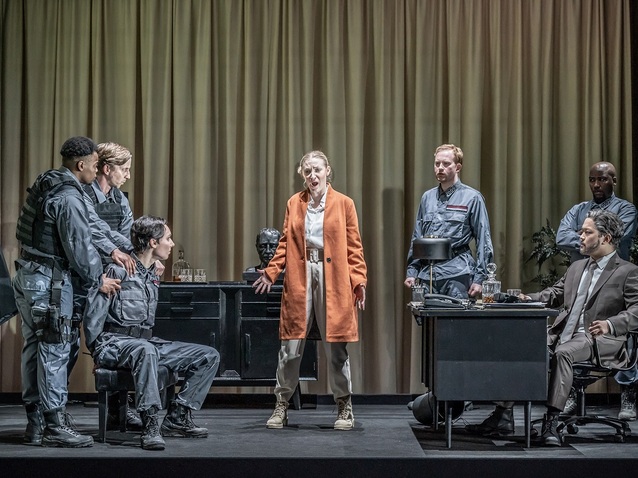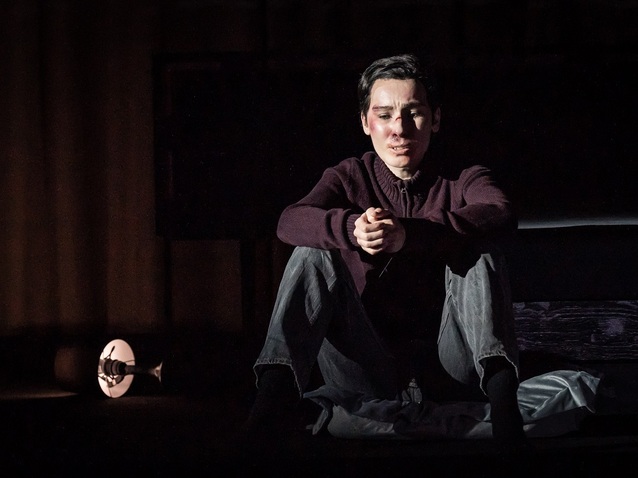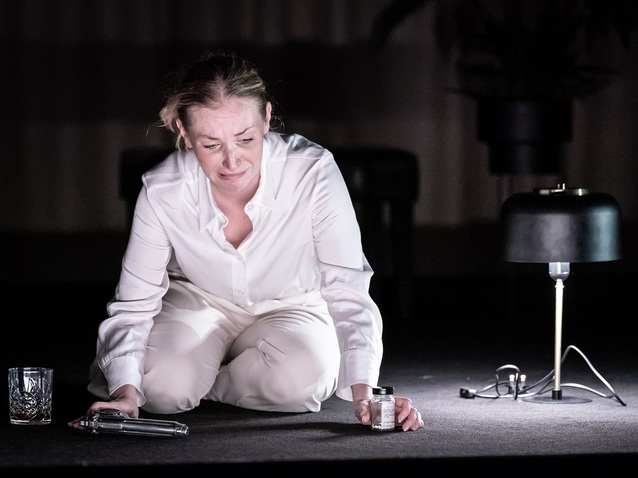 © Marc Brenner
© Marc Brenner
Georg Friedrich Handel’s Arminio, with a libretto by Antonio Salvi that had previously been set to music by Alessandro Scarlatti, was not a great hit when it premiered on 12 January 1737 at the Theatre Royal, Covent Garden. Despite the composer’s output being as prolific as ever, this was not an easy time for him as he was competing for audiences with the rival Opera of the Nobility when there was really not enough potential audience in London to support two houses. Although the opera seems to have been esteemed by Handel’s admirers, it was less so by the public and closed after six performances, only to be seen again in Leipzig in 1935. It may have enjoyed more outings since the 1960s, in line with a more general revival of interest in the composer’s operas, but Mathilda du Tillieul McNicol’s new production in the Royal Opera House’s Linbury Theatre constitutes the first time that the work has returned to the site of its premiere in 1737.
The story is a fictionalisation of events surrounding the Germanic leader Arminius, who defeated the Romans under Publius Quinctilius Varus at the Battle of the Teutoburg Forest in AD 9, and his wife Thusnelda. When the Roman General Varo and his advisor Tullio discover that Arminio and his father Segismero have been plotting to ambush the Romans as they seek to expand further into Germania, they desire to capture him. Their plan, however, to ensure that he submits to Rome is thwarted by the simple fact that Arminio would rather die than do so. Things are further complicated by the fact that Varo himself is in love with Arminio’s wife Tusnelda, while Tusnelda’s own father Segeste, also a Germanian, is collaborating with the Romans. This puts Tusnelda’s brother Sigismondo in a particularly difficult situation as he is in love with Arminio’s sister Ramise, yet his father has been responsible for arresting her brother and presenting him to the Romans.

Arminio, Gabriele Kupsyte (c) Marc Brenner 2023
Even by the measure of most Handel operas, the plot is on the complicated side, meaning that the ‘family tree’ that is presented on a screen outside the Linbury Theatre is very welcome. By the same token, however, the piece is thematically rich with the story playing out in such a way as to make Sigismondo’s dilemmas particularly large and acute. One of the most interesting aspects is the fact that Arminio ultimately views his adversary Varo as a good man to such an extent that, when he faces death, he urges him to marry Tusnelda after he is gone. In this way, rather than suggesting that all the Germanians are wholesome and all the Romans evil, the story implies that a person’s virtue can be judged by their loyalty. Despite supporting the same side, Varo and Segeste are poles apart since the former is doing his duty, while the latter’s actions are purely self-serving. There is even a sense in which the Romans, despite benefiting from Segeste’s disloyalty to his own, judge him harshly for it.
Although the music cannot be considered to be Handel’s finest, and judged by the composer’s own high standards Act I feels quite run of the mill, things pick up substantially in Acts II and III. A few arias stand out in particular, and it may be no coincidence that those that feel the most moving from a musical perspective - Arminio’s ‘Vado a morir’ and Tusnelda’s ‘Ho veleno’ - are also those in which the subject under consideration is particularly poignant.

Arminio, Sarah Dufresne (Tusnelda) (c) Marc Brenner (2023)
With Arminio’s sword becoming a gun, director Mathilda du Tillieul McNicol sets the action in the modern day, believing that the ‘complex web of intrigues in which people’s loves and lives are at stake feels all too contemporary’. In line with her idea of a ‘visual and psychological landscape inspired by the political thrillers we devour on the small screen’, Noemi Doboczi’s set helps us to experience the action in close-up. The Linbury Theatre is an intimate space anyway, but by placing two rectangular performance areas on the stage that can each be revealed or obscured by curtains, we feel as if we are being drawn to what to look at as a camera may do. On occasions, we also witness a ‘spilt screen’ effect as action takes place in the two spaces simultaneously. For example, when Varo proclaims in ‘Al lame di due rai’ that love can inspire great feats of glory the sight of subordinates arresting Arminio (albeit on Segeste’s instigation) rather undermines the sense of valour of which he sings. One of the two spaces shows Segeste’s office, so that the character feels like the head of a business who has taken the course of action that seems the most expedient or administratively convenient to him. Interestingly, the room contains a bust that, although modern, reveals a broadly Roman haircut and features, meaning that it could pass for a portrait of the Emperor Augustus as much as of the chief executive of the company. The other area reveals a bedroom, and with this being the place where Arminio is kept prisoner, in the context of the modern day it feels akin to him being kept under house arrest.
This is the 2023 Jette Parker Artists Linbury production, comprising a cast and crew from the programme that is designed to develop young talent. The Orchestra of the Early Opera Company is conducted extremely well by André Callegaro, and the cast is superb. In the title role, Gabrielė Kupšytė reveals a highly accomplished mezzo-soprano, while as Tusnelda Sarah Dufresne’s soprano is deeply feeling and makes for an exceptionally emotive performance. As Segeste, Josef Jeongmeen Ahn’s presence is every bit as commanding as his fabulous baritone, while Isabelle Peters proves especially strong at conveying, and reacting to, the huge dilemmas with which Sigismondo is presented. There are also excellent performances from Kamilla Dunstan as Ramise and Kamohelo Tsotetsi as Tullio, while Michael Gibson reveals an exceptionally fine tenor as Varo. The happy ending to this otherwise thoughtful opera seems rather risible as one character’s sudden change of heart feels as false as it does in the slightly more frequently performed Radamisto of 1720. This production, however, goes some way to making the problematic conclusion work by adding an action that it seems plausible one figure would choose to take, and which ensures that certain behaviours we have witnessed prior to this are not simply forgotten.
By Sam Smith
Arminio | 20 April - 6 May 2023 | Linbury Theatre, Royal Opera House, Covent Garden
the 25 of April, 2023 | Print
Comments